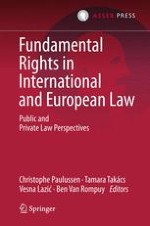2016 | OriginalPaper | Buchkapitel
13. Rights and Wrongs of and About Nationality in Sports Competition
verfasst von : James A. R. Nafziger
Erschienen in: Fundamental Rights in International and European Law
Verlag: T.M.C. Asser Press
Aktivieren Sie unsere intelligente Suche, um passende Fachinhalte oder Patente zu finden.
Wählen Sie Textabschnitte aus um mit Künstlicher Intelligenz passenden Patente zu finden. powered by
Markieren Sie Textabschnitte, um KI-gestützt weitere passende Inhalte zu finden. powered by
